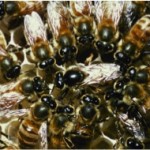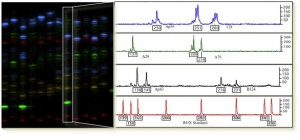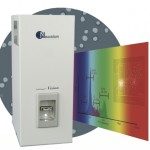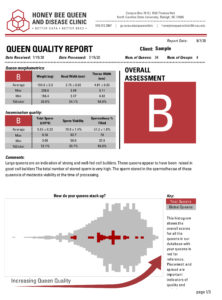Queen & Disease Clinic
go.ncsu.edu/readext?251513
en Español / em Português
El inglés es el idioma de control de esta página. En la medida en que haya algún conflicto entre la traducción al inglés y la traducción, el inglés prevalece.
Al hacer clic en el enlace de traducción se activa un servicio de traducción gratuito para convertir la página al español. Al igual que con cualquier traducción por Internet, la conversión no es sensible al contexto y puede que no traduzca el texto en su significado original. NC State Extension no garantiza la exactitud del texto traducido. Por favor, tenga en cuenta que algunas aplicaciones y/o servicios pueden no funcionar como se espera cuando se traducen.
Português
Inglês é o idioma de controle desta página. Na medida que haja algum conflito entre o texto original em Inglês e a tradução, o Inglês prevalece.
Ao clicar no link de tradução, um serviço gratuito de tradução será ativado para converter a página para o Português. Como em qualquer tradução pela internet, a conversão não é sensivel ao contexto e pode não ocorrer a tradução para o significado orginal. O serviço de Extensão da Carolina do Norte (NC State Extension) não garante a exatidão do texto traduzido. Por favor, observe que algumas funções ou serviços podem não funcionar como esperado após a tradução.
English
English is the controlling language of this page. To the extent there is any conflict between the English text and the translation, English controls.
Clicking on the translation link activates a free translation service to convert the page to Spanish. As with any Internet translation, the conversion is not context-sensitive and may not translate the text to its original meaning. NC State Extension does not guarantee the accuracy of the translated text. Please note that some applications and/or services may not function as expected when translated.
Collapse ▲A Beekeeper’s most important tool is knowledge.
-
- Yearly, roughly 40% of all colonies in the US die and must be replaced
- Nearly 30% of newly-installed queens die in the first 6 months
- Sustainable apiculture requires detailed data not easily gathered in the apiary alone
The reproductive quality of queens, and the drones with which they mate, has been among the top management concerns of beekeepers for the last decade. Being able to verify cohorts of queens for their mating success, identifying failing queens, determining disease, or diagnosing laying problems are all helpful for successful beekeeper management.
Testing colonies for diseases and genetics is equally important. We can measure virus levels within colonies and compare them to baseline data to determine potential deviations that affect colony health. The importance of Africanized bees is also an ever-increasing threat, particularly on the Eastern seaboard, so a diagnostic genetic test is the standard means of determining Africanization. Finally, intracolony genetic diversity is important for many aspects of colony function, thus our high-throughput process of calculating effective paternity frequency of the queen (=mating number) can be useful for both the beekeeper and honey bee scientists.
Beekeepers are on the front-line in identifying and solving apicultural problems. The Honey Bee Queen and Disease Clinic, conducted by the North Carolina State University Apiculture Program, empowers the engaged beekeeper with the scientific and technical tools to implement truly transformative practices.
Strong Research Foundations
Established as a natural extension service leveraging basic and field honey bee research at NC State, the clinic has worked to improve colony health for over 10 years. We offer the following services.
Quality Assurance
Morphometric Analyses–multiple measures of queen or drone, body and reproductive tract to test rearing quality 
Semen Quality–total sperm count, and sperm viability in queens to determine mating success and longevity; in drones, for mating potential and rearing environment
Genotyping Analyses–full assessment of paternity for up to 48 workers and an estimate of queen mating frequency
Troubleshooting
Pathogen Screening–identification of the presence and relative levels of ABPV, BQCV, DWV(A&B), IAPV, LSV, Trypanosomes, and both Nosema species
 Mitotyping for Africanization—genetic analyses of maternal ancestry as African or European using population genetic techniques and markers
Mitotyping for Africanization—genetic analyses of maternal ancestry as African or European using population genetic techniques and markers
Customized Experiments
Highly-tailored collaboration between science and industry that involves custom experimental design, analyses and interpretation. Examples of application:
- Assessing the effects of banking on queen quality
- Evaluating queen mating quality following novel management practices
- Testing the impact of agricultural chemicals on any of the above measures
- Observing the effects of shipping on queen health and sperm quality
More information at: https://www.ncsuapiculture.net/queen-and-disease-clinic
Queen & Disease Clinic Pricing
(five sample minimum, bulk pricing available)
| Samples Tested | ||||
Analysis |
Price per sample |
Queens |
Drones |
Colonies |
| Reproductive Quality | $28.00 | √ | √ | |
| Standard Pathogen Screen | $64.00 | √ | √ | √ |
| Apiary Pathogen Screen | $250.00* | *up to 10 colonies, pooled | ||
| Mitotyping (Africanization) | $40.00 | √ | √ | √ |
| Genotyping (mating number) | $370.00 | √ | ||
Custom Disease Screening – Additional and custom pathogen targets available upon request.
Shipping Samples and Receiving Your Report
To request a quote for any of the above services, or to request other testing, please email us directly. Following acceptance of our quote, you will receive an invoice by email. We accept payment by check made out to “NC State University” or you may pay by credit card using our online payment system.
Once a date is mutually arranged to send your samples, all bees must be mailed while alive unless otherwise indicated. Overnight delivery (early in the week) should be made to the shipping address outlined on the invoice. Samples will be processed once payment is received.
Processing time depends on the type and number of analyses, as well as the number of samples to be measured and the length of the queue in sample processing. However, our high-throughput processing procedure typically results in sending a report within 5-7 business days of receiving the samples.
Queen Clinic Quality Reports
A “grade” report of your queens’, or drones’, relative reproductive quality is produced following completion of testing. This places the findings into context and allows for fast and reliable interpretation. Here is a sample report.


